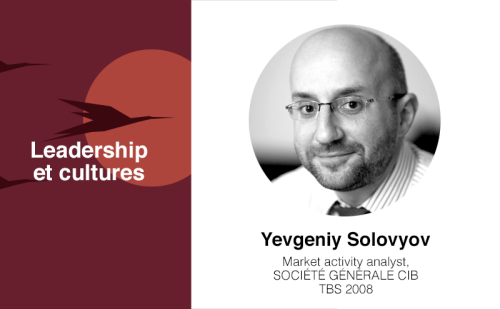From local managerial proximity to International conviviality
From Paris to Hong Kong, Bernard has lived several lives as an HRD in the same regional function: From corporate management, to steering the greater Europe to field management where adaptation to each local culture has proved fundamental. Here is a look back at his experience in Asia, which allowed him to get to know 22 different versions of the International scene.
Bernard Coulaty
TBS 1986
Former International HRD, Professor of Leadership at IÉSEG School of Management
|
Can you tell us about your background? I graduated from Sup de Co Toulouse in 1986, and at the same time completed a Master 2 in HR in Aix-en-Provence. I started working at Danone’s as HR manager of different industrial sites : 10 years of experience in the field with a background in "French-style" social relations. In 2001, I joined the Pernod Ricard Group as an International HR manager. First of all, at the head office in France, I was in charge of the extended Europe zone (comprising some thirty countries including Russia). Then I was expatriated to Hong Kong in 2009 to coordinate the whole of Asia (China, India, Japan, Korea and South-East Asian countries). While in Paris it was possible to coordinate the subsidiaries around the same policy, with fairly similar managerial practices, the reality in Asia was quite different. The cultural differences are too great to be aligned, not to mention the clash of distances (a minimum of 6 hours from one country to another compared to 2 hours in Europe). |
 |
| "The commitment of French expatriates impresses the locals in general” |
This requires local management and therefore a lot of time and energy to devote to each country. I then left the corporate world to devote myself to Human Resources consulting, particularly in the field of work engagement, first in 2016 in Hong Kong to support French companies there, then back in France in 2019. Since then, I share my time between an independent consultant activity in these fields and a leadership professor at the IESEG School of Management, which I joined in 2020.
Do you think there is a "French Touch" to leadership?
In France, management is close to its teams; in Asia, it is important to keep a certain distance even if there are disparities (more in India and Japan than in China, for example). This is the complexity of Asia! The French manager is seen by local employees as professional, hard-working, highly invested and pragmatic (compared to our more procedural German or English colleagues), but also arrogant and individualistic (the lack of collective spirit can be a problem in China). From a team management point of view, while the confrontation of ideas in meetings is usual and appreciated in France, it is very difficult in North Asia where hierarchy is predominant. The notion of "face" must be integrated : Employees will not counter the arguments of their hierarchy in a meeting in front of their colleagues! It is therefore preferable to meet with employees on a one-to-one basis to gather their opinions, as they will express themselves more freely. Only top-down meetings are effective, which has the merit of limiting the phenomenon of meetingitis! In Southeast Asia, employees can express themselves more freely because the countries are still young and the level of education is lower; similarly, in Hong Kong, which is very westernised, the differences are smaller. In this context, it is necessary to be a chameleon, in order to adapt management to each country.
| It is therefore a real advantage to be a Frenchman from the parent company, a guarantee of neutrality, and able to take on the role of peacemaker. |
Is it comfortable for a French person to manage teams from another culture?
First and foremost, it is essential to send an expatriate manager that already possesses strong leadership qualities, and not only a good technician or expert. A strong human dimension is fundamental to be able to adapt locally et bring people on board with you. In Asia, the locals are generally quite happy to have a foreign regional manager. Indeed, the cultural imprint is so strong that it generates a climate of competition between countries (besides, "Asia" does not exist as such for them). Under these conditions, a manager from one of these countries will not be able to ensure cohesion at regional level. It is therefore a real advantage to be a Frenchman from the parent company, a guarantee of neutrality, and able to take on the role of peacemaker. However, this differs depending on the business line: while a position in Finance, Marketing or Supply Chain can be held by a frech expatriate, it is preferable to have a local manager for the Sales and HR functions in order to best respond to the specificities of each country.
| "Who will win the game: the country's culture or the company's culture? |
Do teams operate differently ?
Because of their cultural differences, behaviors are obviously different. The psychologist Geert Hofstede has established a scale to classify countries according to 5 criteria: Power distance, individualism vs. collectivism, masculinity vs. femininity, avoidance of uncertainty and long-term orientation. Whether it is on the relationship to time, proximity or collective spirit, there are significant differences between France and the Asian countries (and even between them). From a managerial point of view, the question is whether one believes more in local cultures or in the company culture.
|
"Who will win the game: the country's culture or the company's culture? |
Do you have to adapt to each culture or does your corporate culture manage to transcend these differences?
I have found that if the corporate culture is weak, poorly defined or not well shared, you are more at the mercy of local specificities and you have to be 'surgical' to get your way. At Pernod Ricard, the multicultural dimension is well experienced because the group knows how to integrate the cultures of each country. However, the company's values are strong and therefore shared throughout the world. Conviviality, Pernod Ricard's flagship value, skillfully brings all countries closer to each other - to the teams and to the customers - and thus brings them closer to the corporate culture. Recruiting local teams is therefore key: at Pernod Ricard, we need to find the friendliest Japanese and the most rigorous Thais... in short, personalities that best fit with the group's culture.
What role do economic conditions play in leadership?
In Asia, the job market is completely unbalanced as there are jobs everywhere. Moreover, loyalty to one's employer does not exist : Employees easily leave one company for another (except in Japan). Finally, the latter have a particular relationship with money: they are in a hurry to earn a living very quickly and to obtain a high rank, generating an inflation of titles (the famous "face" culture). Faced with the real or perceived arrogance of candidates, employers must educate their managers to attract and above all retain talent by reinforcing actions to generate commitment in the teams. Unfortunately, you can try to retain them with money, but that won't be enough in the medium or long term and it is very inflationary! This is where leadership is fundamental in Asia: you have to have a certain charisma and a very good ability to influence others, because they don't come to you naturally. It is often said that "You join a company, you leave a manager". So it's not a question of retaining your employees, but of making them want to stay. And that can only be done through commitment!
Do you have any advice to share with our alumni wishing to expatriate?
I would say that going abroad is not an end in itself. You have to do it if it makes sense with your professional project, in a company you like, and if the culture of the host country speaks to you. And it must also be in line with your personal situation: as the family is often involved, you must make sure that your spouse and children feel comfortable, as it is a new lifestyle to adopt. There are generally two key moments to leave: either immediately after graduation (most often as a VIE), or when it is part of your company's project (and you often have to prove yourself internally beforehand). It can happen at a time when you don't expect it.
| « The gift is to leave » |
For me, expatriation was never an objective in itself, even though I liked the international scene. And then one day, a train passed by: I was 45, my children were teenagers, not necessarily the right timing, and we did it! And it was an incredibly rich 10 years, for them too, even if the start was hard; we came back transformed. Another piece of advice is not to see this as a springboard for a "gift" in return: the gift is to leave! Often returns are synonymous with the blues, as expatriates do not feel valued enough by their colleagues who have stayed. It is essential not to get caught up in this kind of motivation and to do it for the experience itself... and above all to live this experience to the full!
Author

Je peux vous conseiller et vous accompagner sur les sujets suivants :
• Marketing digital : online & retail media, CRM, stratégie data, sites web, réseaux sociaux, brand content.
• Ressources Humaines : marque employeur, inbound recruiting, projets web (site carrière, ATS), recrutement (CV et LM, conduite d’entretien).
• Transformation digitale : conduite du changement et montée en compétence des équipes.
Basée à Toulouse, vous pouvez me contacter au préalable par email. Je suis disponible le weekend ou le soir en semaine. See the author's other publication






















No comment
Log in to post comment. Log in.